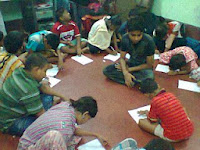Happenings, Dec '13 (update 2)
Pawan Dhall reports on the ‘Trans Queen Contest North-East 2013’, which mixed beauty and creativity with protest against the Supreme Court verdict on Section 377, Indian Penal Code
Imphal, December 14, 2013: “We don’t want to go back to 1860”, “Down down Supreme Court ruling”, “We want freedom of choice”, “Legalize love” and “Two of a kind make a beautiful pair” – these were some of the witty and hard-hitting placards carried by participants at the third edition of the ‘Trans Queen Contest North-East 2013’ held at the Bhagyachandra Open Air Theatre in Imphal yesterday. The event was organized by the All Manipur Nupi Maanbi Association (AMaNA), a coalition of community-based organizations that work on health, development and human rights of male-to-female transgender people or trans women and males who have sex with males in Manipur.
Pawan Dhall reports on the ‘Trans Queen Contest North-East 2013’, which mixed beauty and creativity with protest against the Supreme Court verdict on Section 377, Indian Penal Code
Imphal, December 14, 2013: “We don’t want to go back to 1860”, “Down down Supreme Court ruling”, “We want freedom of choice”, “Legalize love” and “Two of a kind make a beautiful pair” – these were some of the witty and hard-hitting placards carried by participants at the third edition of the ‘Trans Queen Contest North-East 2013’ held at the Bhagyachandra Open Air Theatre in Imphal yesterday. The event was organized by the All Manipur Nupi Maanbi Association (AMaNA), a coalition of community-based organizations that work on health, development and human rights of male-to-female transgender people or trans women and males who have sex with males in Manipur.






















